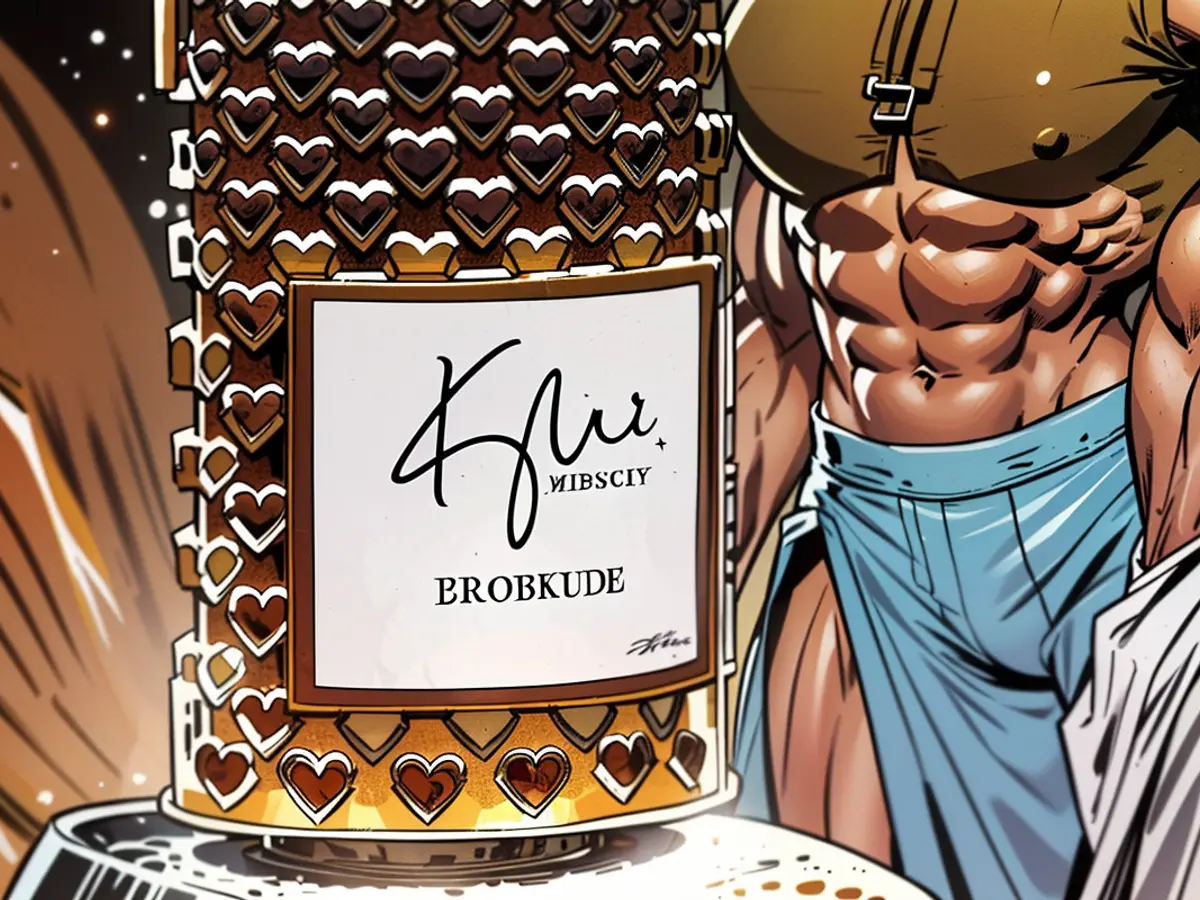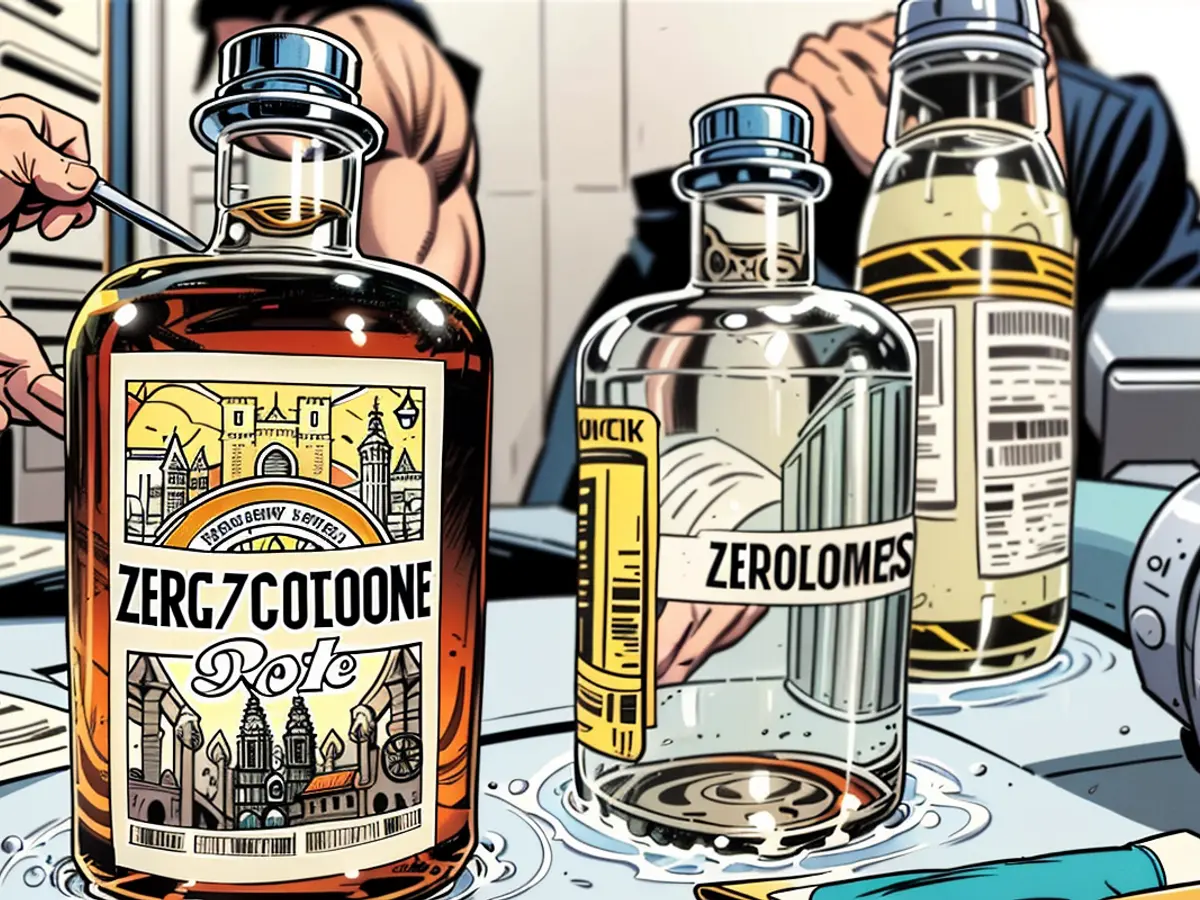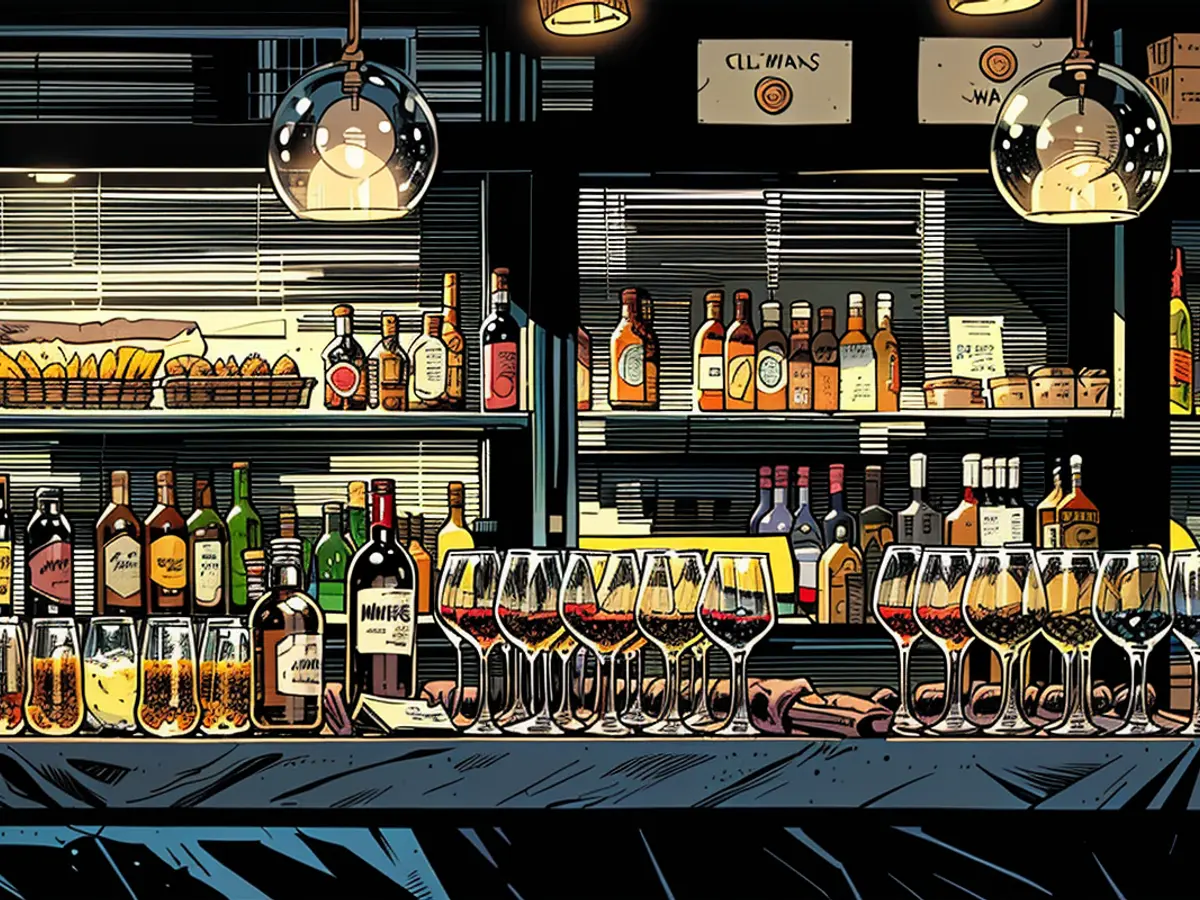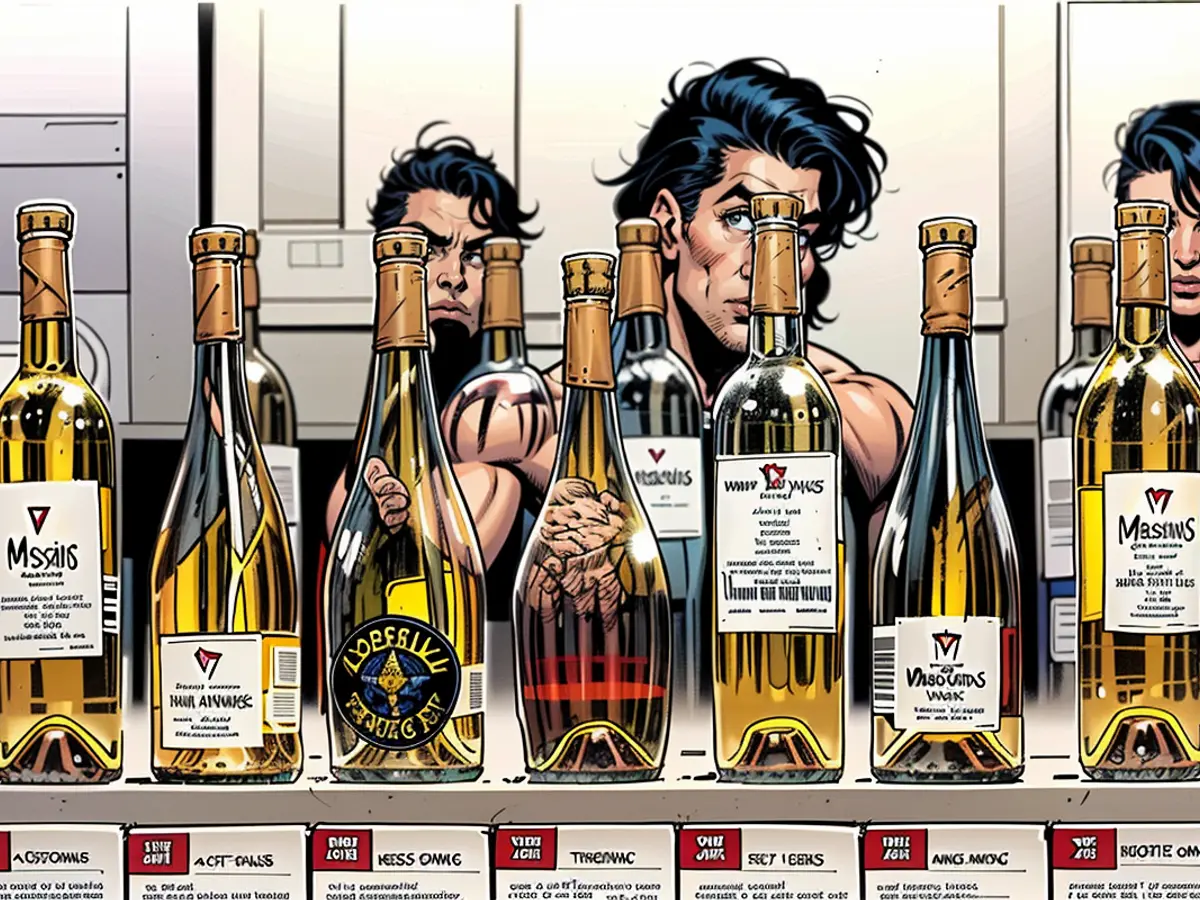Are there any noteworthy non-alcoholic wines that still deliver a delightful flavor?
Straight up, the response is no. Our writer has followed the trend and explored the wine storage room. He lands in an unsatisfying conclusion: This stuff doesn't taste great. However, there's an option to still partake with certain juices.
The eye-opening stats speak for themselves. Following the decline in beer consumption three decades ago, Germany is now consuming less wine as well. This information is shared by the German Wine Institute (DWI). An increasing number of individuals desire to - for various reasons - partially or completely give up alcohol. To cater to this demand, retailers and restaurants have introduced new beverage options. Alone the sale of de-alcoholized wines saw an increase of nearly 30% in 2023. This trend is slowly becoming the norm, not only from the DWI.
Lukas Kloskowski, co-owner of "Viniculture" - the "Berlin wine shop with the most daring range," according to wine journalist Stuart Pigott - confirms the massive demand. "Low and no" is the term used to describe the category of reduced and alcohol-free drinks in everyday jargon. While these options form a small selection at Viniculture, they have their dedicated space. Kloskowski shares that the former owner of their business could no longer drink alcohol and dedicated their time to finding the best alternative.
Sour taste and chemical bitterness
The challenge and disappointment of this search became apparent to the journalist over several weeks. Although the variety of de-alcoholized wines is expanding, the journalist could not find one with a taste good enough to voluntarily consume. Throughout his tasting of 20 samples - from Germany, Spain, France, and Italy - notes of vinegar, sugar solutions, and chemical bitterness prevailed, leaving him with unimpressive juice or stale wine-like taste. (Those interested can find six recommendations for alcohol-free wine at the end of the text.)
A pleasing alternative: Quince Juice
However, perseverance paid off for the journalist when they discovered an enticing alternative to wine at Viniculture. The most delightful drink they found was a completely alcohol-free, concentrated quince juice by Franconian winemaker Stefan Vetter. Price: 12 euros. Vetter's creation offered a play of fruit sugar, acid, and tannins - much like a well-balanced wine; with intensified aromas and a lively, almost dancing presence on the tongue and palate, filling the mouth and delightfully stimulating the saliva. The lingering aftertaste proved every sip to be a memorable delight, whether enjoyed alone or with various dishes. In Berlin's acclaimed restaurant "Nobelhart & Schmutzig", the quince juice has long been a beloved dining companion - as non-alcoholic drinks are fondly called in the world of high-end gastronomy.

Equally surprising was the taste of the distinctly different drinks from Peter Van Nahmen's fruit cellars on the Lower Rhine, Jörg Geiger's on the Swabian Alp, and Klaar Fruit Ferments in Kneese on the Schaalsee.
Peter van Nahmen, who is known for producing "single-varietal" juices in the wine world, such as those made from Riesling and Spätburgunder grapes, offers a distinct sweetness appealing to desserts or as a dessert itself. The less sweet Wild Plum from Piedmont, which costs around eight euros per bottle and is recommended to complement lamb, beef, game, and mushrooms, provides similar enjoyment as British royalty. Proudly, van Nahmen boasts that Charles III was served this plum juice at the state banquet in Bellevue Palace.
The various blends from van Nahmen's presses, known as cuvées, also proved to be palatable. For example, Klaar's "Proxy Rot", a substitute for red wine, is prepared by pressing and mixing various ingredients: elderberries and elderflowers, red beet, aronia, ginger, walnut leaves, as well as apple and quince stems and peels. Its subtle, slightly bitter notes make it an ideal companion for food. At around 13 euros, it is priced on par with high-quality, alcoholic estate wines.
A "Tea" substitute?
Sparkling fruit juices from Jörg Geiger have competitive pricing. His extensive collection is rich in herbs and spices, making them a delightful aperitif, even if Geiger suggests them for many food types. Geiger recommends Prisecco Nr. 11 with unripe Boskop and oak leaves, Aecht Bitter with green hunting pear and wormwood, and Cuvée Nr. 23 with rhubarb, apples, and flowers.
Van Nahmen also creates bubbly fruit beverages like the seccos made from apples and quinces. These are more pleasurable on the second or third day once some of the fizz has dissipated. Conversely, Peter van Nahmen has introduced an original creation with the delightful slightly effervescent JuicyTeas. These are three distinct blends made from juices and tea infusions. Whether it's Darjeeling, rhubarb, and rose, jasmine, ironwort, and Riesling, or white tea, vanilla, and quince - what appears to be a complex liquid experiment is so expertly balanced in taste that the journalist savors them in all their variations. At approximately nine euros, the cost is also quite modest.

"Alcohol-free" isn't entirely devoid of alcohol
The winery St. Antony in Rheinhessen also focuses on tea with its trend-focused subsidiary Châto Zero. There, they bottle "Infiniteas" for around ten euros per bottle: "The Duke of Blacktea" and "The Duchess of Rooibos." Both contain more than just tea - specifically, the subject of this article: de-alcoholized wine! In both instances, it stems from Spain and is derived from the white Chardonnay grape. These blends are refreshingly light, boasting an elegant wine aroma and fine acidity, with a maximum alcohol content of 0.5% by volume, which equates to four grams per liter. Although this is legally considered alcohol-free, the minimal amount serves the taste. Unlike the JuicyTeas, the Infiniteas have fewer fruity aromas, making them even more suitable for food pairing.
For those seeking a similar alternative without fizz, consider 36° Grenache and 32° Riesling, two "silent dining companions" from Jörg Geiger, priced at around 16 euros each and also derived from de-alcoholized wines. The Grenache grape is combined with plum juice and herbs, while the Riesling is mixed with apple juice and herbs. The residual alcohol content here does not surpass 0.3% by volume.
The priciest alcohol-free beverage alternative discovered by the journalist also has a low alcohol content - at Lukas Kloskowski, who exclusively sells them in Germany. They are called Muri Drinks. They come in five carbonated varieties for 23 euros each and one non-carbonated variety for 20 euros. They are brewed in Copenhagen using kefir grains, which explains their distinct aroma and why they don't smell appealing when initially opened. They only fully develop their aroma after being aired for a day. Despite their impressive marketing and cult status in fine dining, these drinks are unique due to their special ingredients and brewing process, and they require courage to try as they do not meet any taste expectations.
De-alcoholizing wine doesn't render it the only innovation to address the growing demand for less alcoholic beverages. However, this does not mean they are pure and clean like a high-quality wine, or subject to similar stringent controls. The de-alcoholization process developed by the Rheingau winemaker Carl Jung over a hundred years ago still has three fundamental drawbacks that can be tasted: firstly, aromas evaporate, secondly, alcohol as a so-called flavor carrier also dissipates, and thirdly, the loss is compensated with sugar enrichment. Furthermore, all these processes are laborious, barely sustainable, and expensive.
Six recommendations for those who still want to try:

- Germany: "Carl Jung" (white: Chardonnay, Riesling, or Cuvée; rosé: Grenache from Spain; red: Merlot, Cabernet, or Cuvée), around 6 euros.
- Germany: "Dr. Lo" by Dr. Loosen (white: Riesling), 9-10 euros
- Germany: "Fabelhaft drink & drive" (white: Riesling), 13-16 euros
- Spain: "Torres Natureo 0,0" (white: Muscat; rosé: Cabernet Sauvignon; red: Syrah), 8 to 10 euros
- Spain: "Torres Sangre de Torro" (white: Muscat; rosé: Cuvée of Syrah and Cabernet Sauvignon; red: Grenache and Syrah), 7 to 9 euros
- Italy: "Doppio Passo" (white: Muscat or Grillo; red: Cuvée), around 7 to 9 euros.
Despite the increasing demand for alcohol-free options, the journalist found that de-alcoholized wines often lacked taste, with notes of vinegar, sugar solutions, and chemical bitterness. Conversely, the European Union, specifically Germany, is seeing an increase in the consumption of de-alcoholized wines, with retailers and restaurants catering to this trend.
In his search for a palatable alternative, the journalist discovered a delightful quince juice by Franconian winemaker Stefan Vetter, offering a well-balanced taste and stimulating aromas. This change in palate preference is not only observed in the European Union but is becoming a global norm.






